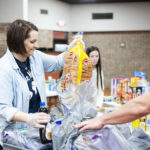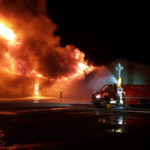SAN MARCOS—All branches of the U.S. Armed Forces embrace an ancient creed—leave no one behind. Comrades in arms feel a keen responsibility toward each other.

Jim Lanning, a retired U.S. Army officer and Vietnam combat veteran, takes that responsibility seriously. And he doesn’t believe it stops when a veteran’s time of military service ends.
At a reunion of Lanning’s infantry unit, he discovered some who served more than five decades ago in a warzone never found inner peace after they returned home. A verse from the Old Testament came to his mind: “Pity the man who falls and has no one to help him up” (Ecclesiastes 4:10).
That reality was underscored when he heard Gene Hooper, the local representative for the Military Veterans Peer Network, address a noon Lions Club meeting in San Marcos. Hooper talked about challenges veterans face.
After the meeting, Lanning—an ordained minister who has served as a church planter and taught at San Marcos Baptist Academy—talked with Hooper about the need to start a faith-based group that could help veterans cope with some of those challenges.
Help veterans find peace and faith
During a two-year stay in upstate New York “on grandparent duty,” Lanning said, God laid on his heart a burden for fellow veterans. So, he discussed a pilot project with his pastor.
Chad Chaddick, pastor of First Baptist Church in San Marcos, recalled when Lanning first raised the idea of a church-based ministry geared specifically toward veterans.
“He said: ‘There are cowboy churches. There are biker churches, What about a veterans church?” Chaddick recalled. “He asked if our church would give its blessing and offer prayer cover. Of course, we encouraged him and promised to pray.”
Lanning launched Veterans Patrol as a pilot project, working in cooperation with a church in New York.
Sign up for our weekly edition and get all our headlines in your inbox on Thursdays
“My desire was to eliminate the traditional barriers that hinder veterans from finding peace and faith,” Lanning said. He wanted to develop a Christian support system of veterans for veterans—men and women who could say to a struggling fellow veteran, “I’ve got your back.”
Lanning considered the pilot group a “recon patrol” finding its way, trusting God would guide them to a model that could be replicated.
The group continued after Lanning returned to Texas and still meets twice a month at Goodwill Church in Montgomery, N.Y.
Instant credibility and camaraderie
Having learned from his experience in New York, Lanning launched Veterans Patrol in South Central Texas. In November 2019, he began Veterans Patrol in San Marcos in partnership with Paul Buntyn, then pastor of Abundant Life Christian Church. Buntyn, who served in the U.S. Marine Corps, also is a Vietnam combat veteran.

Because of their military service, Lanning and Buntyn have instant credibility with other veterans. Lanning earned a Purple Heart, a Silver Star, a Bronze Star, a Combat Infantryman Badge and the Republic of Vietnam Gallantry Cross. Buntyn was awarded two Purple Hearts, a Bronze Star and the Vietnamese Citation of Valor.
“Veterans share a camaraderie and warmth of brotherhood,” Lanning said. Although each person’s military experience is unique, he believes he honestly can say to any veteran, “I know your heart.”
Veterans Patrol describes itself as “veterans standing together in faith to support each other for inner peace.” The group meets the fourth Monday of each month for about an hour and a half at First Baptist Church in San Marcos.
Diversity is a core value of Veterans Patrol. The group is open to male and female veterans of all races and ethnic groups, without regard to the rank they achieved or the particular branch in which they served.
Helping each other find and maintain inner peace and showing respect for one another are the group’s other core values.
One of Veterans Patrol’s objectives is to provide members an understanding of what service means, based on the Bible.
“The New Testament was kind to soldiers,” Lanning said. “Wherever it speaks of centurions, they’re mentioned favorably.”
Understand and practice service
Members of Veterans Patrol not only learn about service, but also practice it. Service projects in San Marcos have included building a wheelchair ramp for a disabled veteran, offering encouragement to patients at a Veterans Administration hospital, and helping veterans navigate bureaucracy to receive the benefits they earned.

Veterans Patrol offers a safe environment where veterans can be open and transparent, sharing their stories with people who have similar experiences in the military.
Newcomers receive a warm greeting: “Welcome home.” Then they are invited to talk briefly about their military journey.
When veterans tell their personal stories and talk about memories they may not be able to discuss with lifelong civilians, they are reminded: “Please—no partisan politics or theological debate.”
But just because they steer clear of campaigning for candidates or arguing about the End Times, that doesn’t mean they dodge sensitive subjects.
“Some discussions can get tense,” Buntyn acknowledged.
For instance, Veterans Patrol participants have talked frankly about racism. They also discussed the involvement of some veterans—who took an oath to defend their country—in the insurrection at the U.S. Capitol on Jan. 6, 2021.
“There’s politics involved. You can’t take the wet out of the water,” Buntyn said. “And we don’t apologize for Jesus. We always bring the discussion back to our core values, and those are biblically based principles.”
Seventeen modules explore subjects such as the characteristics of military culture, women in the military, casualties, the meaning of the oath of service, diversity and the “armor of God” described in Ephesians 6.
Some participants in Veterans Patrol are unchurched. Others are active members of churches of various denominations. However, they are able to talk in Veterans Patrol about experiences and feelings they don’t feel free to share in a Bible study class of people who did not serve in the Armed Forces, Buntyn said.
“We want to hear their stories, help them make connections and help with the healing process,” he said.
Each meeting ends with a simple benediction that carries particular meaning for veterans: “Go in peace.”
Jim Lanning wants to see other Veterans Patrol groups established around Texas, home to 1.6 million veterans. He can be contacted at (512) 216-9519 or [email protected].
For step-by-step instructions on how to begin a Veterans Patrol group, go tohttps://veteranspatrol.org/how_to_organize_your_own_group.
For resources, including each of the 17 modules used in Veterans Patrol, go tohttps://veteranspatrol.org/module_resource_material.
This article originally appeared in CommonCall magazine.














We seek to connect God’s story and God’s people around the world. To learn more about God’s story, click here.
Send comments and feedback to Eric Black, our editor. For comments to be published, please specify “letter to the editor.” Maximum length for publication is 300 words.